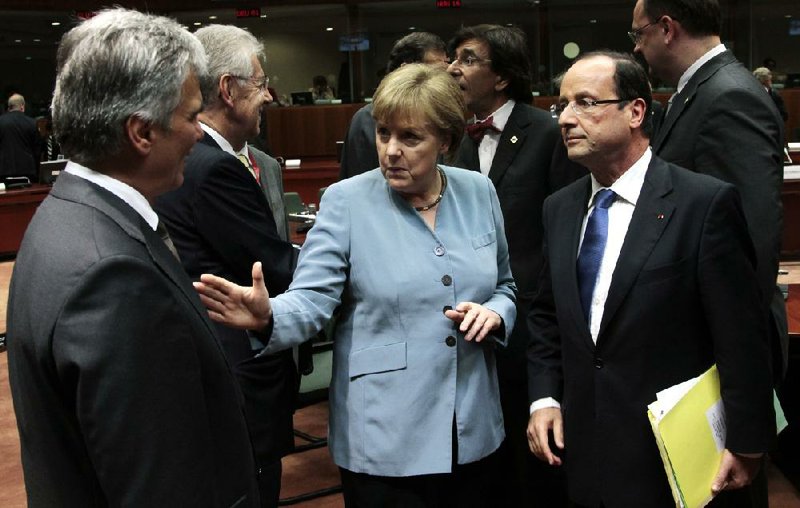BRUSSELS, Belgium — French President Francois Hollande challenged Germany’s handling of the financial crisis on Wednesday as he headed to his first European Union summit with calls for joint borrowing and cash injections to struggling banks.
Hollande teamed with Spanish Prime Minister Mariano Rajoy to press for the meeting of EU leaders to break with German-dominated budget-cutting policies that have failed to stabilize the 17-nation euro area and led to speculation that Greece might be forced out.
France will “put all the ideas for growth and liquidity on the table,” Hollande told reporters in Paris before going to Brussels. “Europeans have to know where Europe is heading. There has to be political direction. Milestones have to be established and goals set.”
The summit, the 18th since Greece was convulsed by debt, took place with market indicators showing mounting stress. The euro tumbled to a 22-month low against the dollar amid concern that divisions between France and Germany will frustrate the search for answers. European stocks fell by the most in a month. Yields on German five-, 10- and 30-year bonds dropped to record levels, as investors sought a haven.
On his ninth day in office, Hollande shifted the crisisfighting optics by holding a pre-summit briefing with the leader of recession-wracked Spain, instead of coordinating with Germany’s Angela Merkel, head of Europe’s dominant economy.
The meeting of leaders of all 27 EU countries started at noon Central U.S. time. The crisis in the euro area will come up only “at the very end,” EU President Herman Van Rompuy said in a pre-summit letter. As of press time, the leaders hadn’t spoken publicly of results of those discussions
The French-Spanish tandem heaped pressure on Merkel, on the defensive at home after her party was routed in May 13 elections in Germany’s most-populous state and internationally after her hard line on deficits was drowned out by pro-growth appeals at last week’s Group of Eight meeting of the world’s largest economic powers.
Arriving in Brussels, Merkel rejected joint borrowing, fueling concern that Germany and France, the EU’s traditional driving forces, are no longer on the same page in attacking the crisis underway since early 2010.
“I don’t think they represent a contribution to growth in the euro zone,” Merkel said of euro bonds. “The very similar interest rates that we had for many years led to serious distortions.”
The clash over euro bonds pits better-off countries led by Germany against France, Belgium, Italy, Luxembourg and peripheral countries relying on European aid or at risk of needing it.
Hollande said Europe must chart a path to common borrowing, should consider enabling its rescue fund to borrow from the European Central Bank and ought to let the fund lend directly to troubled banks.
The latter appeal was coined for Spain’s Rajoy, who is seeking to tap European money to recapitalize banks without tying Spain to the same sort of conditions as Greece, Ireland and Portugal, the three countries drawing on international aid.
“Liquidity, sustainability and debt financing are three points that I am going to talk about,” Rajoy said at the earlier French-Spanish news conference.
Spain is embarking on its fourth attempt in three years to shore up lenders saddled with about $233 billion of what the Bank of Spain calls “problematic” assets. European governments are divided over whether to let the planned permanent rescue fund lend to banks directly, an EU official said Tuesday.
The polemics leave the central bank as the first line of defense in a market panic, though a German-led faction on the central bank is against adding to the $267 billion stockpile of government bonds it has amassed during the crisis.
Hollande also reframed the debate over Greece’s potential exit from the euro, saying it is the job of European leaders —- and not only Greek voters in next month’s election — to make sure the country stays in.
Creditor countries are putting the onus on Greece to continue with budget cuts. Finnish Prime Minister Jyrki Katainen said Wednesday in Brussels that “the euro area has done what we have to do and now we are waiting for the Greek commitment.”
Greece’s June 17 balloting was triggered by the inconclusive outcome of a May 6 election, in which the surge of an anti-bailout party to second place denied a majority to the two parties that have dominated the country since the 1970s.
Next month’s revote looms as a referendum on whether Greece stays in the euro.
“The situation in Greece is very fragile,” Evangelos Venizelos, a former finance minister who now leads the Pasok party, said Wednesday. He sought the support of Socialists like Hollande for “a consensual framework for the common interest of Greece and of the euro zone.”
Information for this article was contributed by Rebecca Christie, Jonathan Stearns, Josiane Kremer, Gabi Thesing, Chiara Vasarri, Gregory Viscusi, Helene Fouquet and Angeline Benoit of Bloomberg News.
Business, Pages 27 on 05/24/2012
